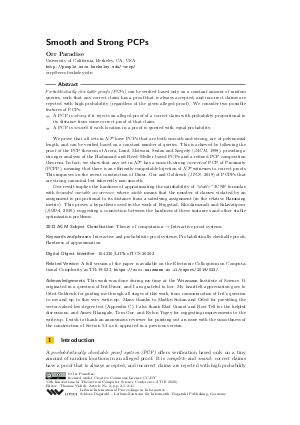@InProceedings{paradise:LIPIcs.ITCS.2020.2,
author = {Paradise, Orr},
title = {{Smooth and Strong PCPs}},
booktitle = {11th Innovations in Theoretical Computer Science Conference (ITCS 2020)},
pages = {2:1--2:41},
series = {Leibniz International Proceedings in Informatics (LIPIcs)},
ISBN = {978-3-95977-134-4},
ISSN = {1868-8969},
year = {2020},
volume = {151},
editor = {Vidick, Thomas},
publisher = {Schloss Dagstuhl -- Leibniz-Zentrum f{\"u}r Informatik},
address = {Dagstuhl, Germany},
URL = {https://drops.dagstuhl.de/entities/document/10.4230/LIPIcs.ITCS.2020.2},
URN = {urn:nbn:de:0030-drops-116875},
doi = {10.4230/LIPIcs.ITCS.2020.2},
annote = {Keywords: Interactive and probabilistic proof systems, Probabilistically checkable proofs, Hardness of approximation}
}

 Creative Commons Attribution 3.0 Unported license
Creative Commons Attribution 3.0 Unported license

